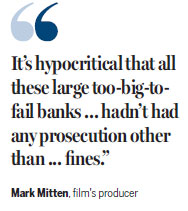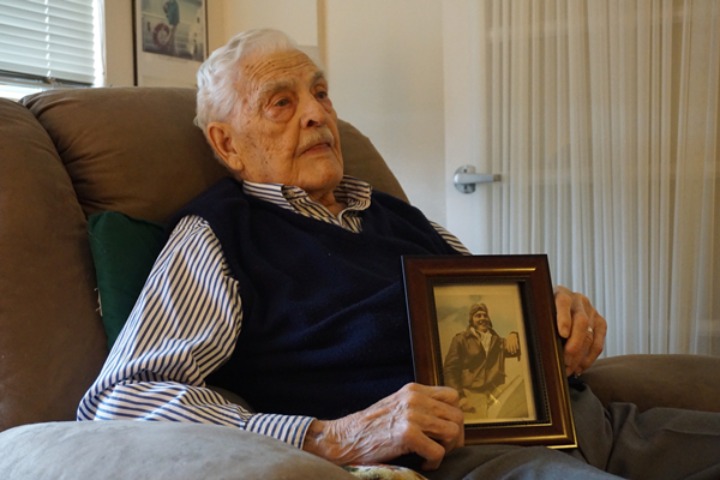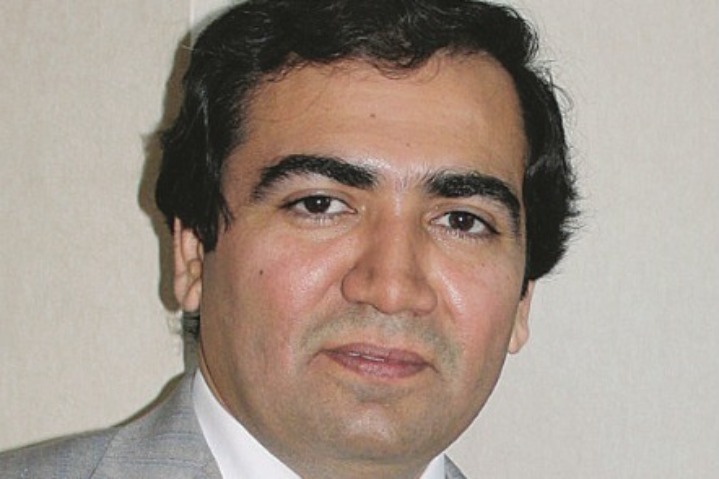Film explores legal ordeal of NY family bank
| Abacus: Small Enough to Jail fi lmmakers and those whose story was featured in the movie attend the 52nd Chicago International Film Festival. From left: producer Mark Mitten; Sung family members Vera, Thomas and Hwei Lin; and director Steve James. Jian Ping / For China Daily |
A sold-out audience packed the screening of Abacus: Small Enough to Jail, a documentary by Steve James shown at the 52nd Chicago International Film Festival on Oct 18.
When the lights came up at the end of the film, the entire audience gave a standing ovation.
Abacus documents the story of the Sung family, owners of Abacus Federal Savings Bank in New York's Chinatown, and their battle against the New York County District Attorney's prosecution on fraud charges.
The DA indicted the bank in May 2012 with a list of nearly 200 counts of charges, including grand larceny and mortgage fraud. After a four-month trial in 2015, the bank was exonerated. However, the Sung family paid $10 million in legal fees and had immeasurable business losses.

The family-owned bank was the only one prosecuted after the 2008 financial meltdown despite its very low default rate. Meanwhile, as the film showed, big banks issued $4.8 trillion in fraudulent loans and paid $110 billion in fines, but no one was prosecuted.
"We were not given an option," Thomas Sung, 80, founder and patriarch of the bank, told China Daily. "It was to plead felony and pay fines, while the big banks were offered fines and settlements and moved on."
Sung, who was born in Shanghai and came to the US as a teenager, served as an immigrtion lawyer in New York before he set up the bank, with the mission to help immigrants realize their American dream.
"I'm very proud that we have helped the Chinese community grow and many immigrants buy their homes," Sung said.
One of the accusations was granting loans to borrowers who didn't demonstrate sufficient income and selling some of these loans to Fannie Mae, "passing the risk to the federal bank," although the bank had "one of the lowest default rates in the entire country."
| Thomas Sung, founder of Abacus Federal Savings Bank, stands in an aisle of the bank's safety deposit boxes with his two daughters, Vera Sung (left) and Jill Sung, who are executives at the bank. Provided To China Daily |
"It's hypocritical that all these large too-big-to-fail banks that hadn't had any kind of prosecution other than paying fines, and yet, they were trying to prosecute this bank," said Mark Mitten, producer of the film.
"That was a tremendous injustice," Mitten said, adding that it was the reason he decided to do the film.
"This film clearly has a point of view that is in sympathy with the Sung family," said director James, an Emmy Award-winning Chicago filmmaker.
James said by spending time with the Sung family, he felt compelled to tell the story by the characters and by the fact that they had discovered an employee was falsifying loan documents themselves.
"They had self-reported, they had even gone a step further and hired an outside investigator to come in and see if there was any other fraud," said James. "They cooperated with the DA's office until the point that they themselves became the target."
"All the evidence was convincing that they were innocent," said James.
Although the filmmakers championed the Sung family, they also included the point of view of the prosecutors, including interviews with Cyrus Vance, the New York County District Attorney, and Polly Greenberg, chief of the DA's major economic crimes bureau at the time.
In one scene in the film, 19 indicted employees of Abacus were brought into the courtroom with their hands chained together to a long rope, even though some of them had already been arraigned and released on bail.
"They were paraded in like criminals in handcuffs," said Vera Sung, Thomas' daughter and an executive at the bank. "That was a deliberate act to humiliate them, to generate the impression that they were guilty. They shouldn't have been treated like that."
"I sat through numerous days of the trial," Mitten said. "I couldn't rationally understand how you could find this bank guilty. Certainly there were some wrongdoing by individuals, but the bank as a whole was doing a wonderful service to the community."
"This is a very strong movie," said Glenn Preibis, 64, from Chicago. "It's one of the best films I've seen over the years. It's so honest and true."
Preibis said he felt embarrassed by the DA's actions.
"The film did a great job demonstrating that even today Asian people can still be the victims of unfair prosecution and bias," said Hauwei Lien, 35, a Chinese American born in the US. "I'm glad the film was made. The story needs to be told," he said. "I hope the film will be shown in more places."
"There is a lot at stake here, more at stake than just their future and reputation." said James, the director.




















